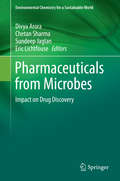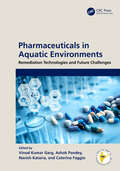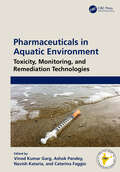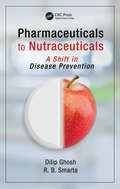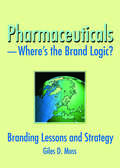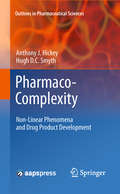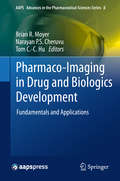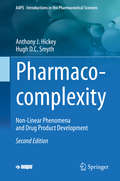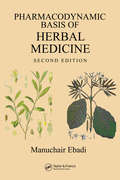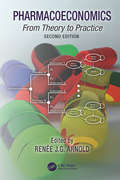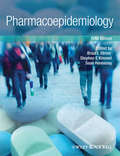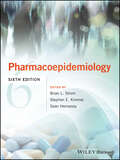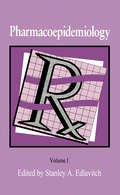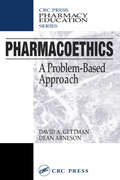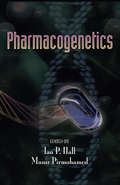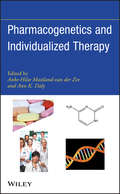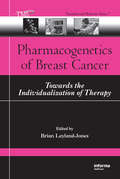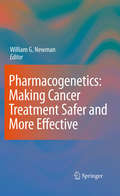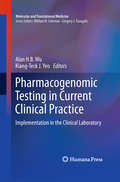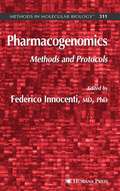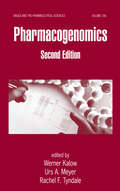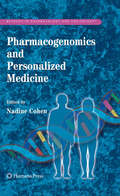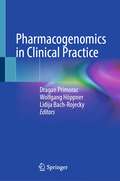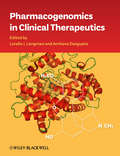- Table View
- List View
Pharmaceuticals from Microbes: Impact on Drug Discovery (Environmental Chemistry for a Sustainable World #28)
by Eric Lichtfouse Divya Arora Chetan Sharma Sundeep JaglanThis book deals with the noteworthy advancement in the production of bioactive metabolites from microbes and their pharmacological significance. It highlights the pharmacological potential of marine microbes and endophytic fungi and their bioactive secondary metabolites. Emphasis is also given on the significance of probiotics and their specialized molecules in human health and disease as well as their role in dietary intervention for reducing the risk of non-alcoholic fatty liver disease. This work also serves as excellent reference material for researchers, students and academicians in the field of natural product chemistry, pharmacology and applied microbiology.
Pharmaceuticals in Aquatic Environments: Remediation Technologies and Future Challenges
by Ashok Pandey Vinod Kumar Garg Navish Kataria Caterina FaggioThis book covers pharmaceutical residue dispersion in the aquatic environment and its toxic effect on living organisms. It discusses conventional and advanced remediation technologies such as the use of biomaterials for the sequestration of contaminants, nanotechnology, and phytoremediation. The book includes topics such as the removal of pharmaceutical and personal care product residues from water bodies, green chemistry, and legal regimens for pharmaceuticals in the aquatic environment. It also covers the application of modified biochar in pharmaceutical removal.FEATURES Explores the management of the environment through green chemistry Describes phytoremediation technology for decontamination of pharmaceutical-laden water and wastewater Covers the detection methods and quantification of pharmaceutical residues in various contaminated sources Discusses ecotoxicological aspects and risk assessment of pharmaceuticals in the aquatic environment Reviews degradation and treatment technologies including nanotechnology, biomaterials, and biochar This book is meant for pharmaceutical, toxicology, and environmental science industry experts and researchers.
Pharmaceuticals in Aquatic Environments: Toxicity, Monitoring, and Remediation Technologies
by Ashok Pandey Vinod Kumar Garg Navish Kataria Caterina FaggioThis reference book compiles up-to-date research about the threat and management of pharmaceutical residue dispersion in the aquatic environment. It explores the risk analysis and short- and long-term health issues created due to the ingestion of pharmaceutical-contaminated food products and drinking water. The book focuses on the methods of removal and degradation processes of pharmaceutical residues from contaminated sources. It emphasizes the importance of eco-friendly and advanced treatment technology for the sustainable management of wastewater and drinking water supply. The book is meant for industry experts and researchers in pharmaceutical science, toxicology, and environmental sciences.
Pharmaceuticals to Nutraceuticals: A Shift in Disease Prevention
by Dilip Ghosh R. B. SmartaRecently, there has been a fundamental shift in the global health and wellness industry from disease treatment to preventing chronic diseases. The use of nutraceuticals and functional foods in prevention efforts could lead to a decreased dependency on drugs. The pharmaceutical industry recognizes this shift; however, serious concerns have arisen regarding the claimed efficacy, quality, and safety of products used as medical foods. This book examines the consumer and industry mindshift, including the scientific evidence of these foods as effective adjuncts to pharmacotherapy during all stages of treatment of various diseases, thus indicating that pharmaceuticals and nutraceuticals can and should coexist. It details quality, safety, and efficacy of foods, drugs, and nutrients; marketing and product positioning; regulatory perspectives; biomarkers and metabolites; probiotics; food/drug interactions; and future industry trends. In addition, food bioactives represent diet-based molecules that perform physiological roles related to disease prevention and treatment. As such, a considerable overlap exists between food bioactives and drugs—this book presents the case for comparing and contrasting foods versus drugs in several models of health and disease.
Pharmaceuticals-Where's the Brand Logic?: Branding Lessons and Strategy
by Giles David MossInsights and analysis that challenge current thought on consumer branding theory and strategy Pharmaceutical companies need to go beyond simply relying on strong sales forces and innovative research and development to succeed. Effective branding strategy is essential. PharmaceuticalsWhere’s the Brand Logic?: Branding Le
Pharmaco-Complexity
by Anthony J. Hickey Hugh D.C. SmythThe historical approach to the interpretation of physical, chemical and biological phenomena has been to consider relationships with causative factors that can be reduced to linearity allowing simple and direct interpretation. However, it is increasingly evident that there is often more information in the data than linear interpretations allow. The current capacity for computers to assist in identifying non-linear relationships allows greater interpretation of data which illuminates the phenomena allowing the information to be translated into knowledge that can be used wisely to promote various desirable pharmaceutical outcomes. This short volume is intended to stimulate the reader to contemplate research and development areas in which the data might be more accurately interpreted to allow greater understanding and ultimately control of the pharmaceutically complex phenomena.
Pharmaco-Imaging in Drug and Biologics Development
by Brian R. Moyer Narayan P. S. Cheruvu Tom C.-C. HuThe volume aim to be a comprehensive overview of the drug and biologic development process that is often called "the valley of death" (pre-IND through approval) where high costs of studies and high rates of product failure are part of the drug development landscape. Imaging tools can serve in this period by adding high value data, the images and the kinetic information they can provide, and cost-effective development alternative tools which potentially improve pivotal study designs. Imaging may identify safety issues early such as unwanted organ or tissue distributions, and then can serve advanced development with added certainty of a drug or biologic's success to senior corporate management and investors. There are numerous textbooks, reference texts and treatises on medical imaging technologies, teaching tools on medical cases and physics books on the science of detector and computer interface systems. Rarely, in each of these are examples of medical imaging protocols and animal models of disease i. e. a text on methodology in drug development is currently unavailable.
Pharmaco-complexity: Non-Linear Phenomena and Drug Product Development (AAPS Introductions in the Pharmaceutical Sciences #1)
by Anthony J. Hickey Hugh D.C. SmythNon-linear phenomena pervade the pharmaceutical sciences. Understanding the interface between each of these phenomena and the way in which they contribute to overarching processes such as pharmaceutical product development may ultimately result in more efficient, less costly and rapid implementation. The benefit to Society is self-evident in that affordable treatments would be rapidly forthcoming. We have aggregated these phenomena into one topic “Pharmaco-complexity: Non-linear Phenomena and Drug Product Development”.
Pharmacodynamic Basis of Herbal Medicine
by Manuchair EbadiContinuing in the tradition of the acclaimed first edition, Pharmacodynamic Basis of Herbal Medicine, Second Edition examines in extensive detail the physiologic effects of complimentary and alternative therapies, foods, supplements, vitamins, and traditional herbal remedies. The author considers the site, mode, and mechanism of action to ex
Pharmacoeconomics: From Theory to Practice
by Renée J.G. ArnoldIn this era of finite budgets, healthcare rationing, medication shortages, and the global aging and burgeoning of populations, numerous stakeholders in the healthcare arena must understand the basic principles of pharmacoeconomics and how these may be correctly applied to facilitate drug development, rationing, patient segmentation, disease management, and pricing model development. Pharmacoeconomics: From Theory to Practice, Second Edition focuses on how to more efficiently and rationally leverage these healthcare resources, not by restricting access to necessary services, but by using them more efficiently. This updated volume arms decision makers with the tools they need to make wise choices in an area where the stakes are extremely high—the health of the global population. Key Features: Introduces the major concepts and principles of Pharmacoeconomics Gives updated information about pharmacoeconomic models, value-based pricing, novel modelling methodologies and international utilization of these modalities in government, the pharmaceutical industry, and health care settings Demonstrates the full range of ethical and moral issues, as well as overall public health and commercial concerns that are often involved in decisions entailing pharmacoeconomic issues Presents both theory and methodology discussions, including real-world examples, in each chapter
Pharmacoepidemiology
by Brian L. Strom Sean Hennessy Stephen E KimmelNow in its fifth edition, Pharmacoepidemiology defines the discipline and provides the most comprehensive guidance of any book on the topic. Written by world renowned experts in the field, this valuable text surveys the research designs and sources of data available for pharmacoepidemiologic research, and provides descriptions of various automated data systems, along with the advantages and disadvantages of each. Incorporating perspectives from academia, industry and regulatory agencies, this book provides detailed insights into all aspects of pharmacoepidemiology.
Pharmacoepidemiology
by Brian L. Strom Sean Hennessy Stephen E. KimmelThis classic, field-defining textbook, now in its sixth edition, provides the most comprehensive guidance available for anyone needing up-to-date information in pharmacoepidemiology. This edition has been fully revised and updated throughout and continues to provide a rounded view on all perspectives from academia, industry and regulatory bodies, addressing data sources, applications and methodologies with great clarity.
Pharmacoepidemiology
by Stanley EdlavitchThis volume is comprised of papers presented at the Third International Conference on Pharmacoepidemiology, held September 9-11, 1987, in Minneapolis, Minnesota. The book is divided into four sections, which reflect the four themes of the conference: Social Impact of Pharmacoepidemiology; Drug Epidemiology and the Law; Drug Surveillance; and Drugs, Populations, and Outcomes: Specific Studies. The collection of papers discusses the social and legal impact of epidemiology, the system of checks and balances that is necessary for the field, the importance of core support for researchers, and the goal of an enlightened and informed public, including the media, consumer advocates, and the courts. Contributing authors offer perspectives from academia, practice, government, industry and the law. Numerous tables and figures are included to illustrate many of the papers within the text. This book offers substantial reading for epidemiologists and individuals interested in the field of pharmacoepidemiology.
Pharmacoethics: A Problem-Based Approach (Pharmacy Education Ser. #Vol. 16)
by David A. Gettman Dean ArnesonDue to the changing nature of the practice of pharmacy, today's pharmacists, pharmaceutical scientists, and researchers are faced with an increasing amount of ethical dilemmas. Pharmacoethics: A Problem Based Approach not only introduces the current ethical issues, it also provides decision making tools that can be applied to any ethical issue that
Pharmacogenetics
by Ian P. Hall Munir PitrmohamedThe only source on the subject to offer both an overview and a disease-based approach, this reference text spans the wide array of technical, methodological, regulatory, and ethical issues related to pharmacogenetics and stresses the impact of pharmacogenetic data on patient care and management. Providing expertly selected references, tables, and f
Pharmacogenetics and Individualized Therapy
by Anke-Hilse Maitland-van der Zee Ann K. DalyThis resource provides thorough coverage of pharmacogenetics and its impact on pharmaceuticals, therapeutics, and clinical practice. It opens with the basics of pharmacogenetics, including drug disposition and pharmacodynamics. The following section moves into specific disease areas, including cardiovascular, psychiatry, cancer, asthma/COPD, adverse drug reactions, transplantation, inflammatory bowel disease, and pain medication. Clinical practice and ethical issues make up the third section, with the fourth devoted to technologies like genotyping, genomics, and proteomics. In the fifth part, chapters discuss the impact of key regulatory issues on the pharmaceutical industry.
Pharmacogenetics of Breast Cancer: Towards the Individualization of Therapy (Translational Medicine Ser. #Vol. 7)
by Brian Leyland-JonesPharmacogenetics is becoming increasingly relevant in the diagnosis, treatment, and recovery of cancer patients. A major problem facing oncologists is the outstanding varied efficacy of treatment. Promising advances in pharmacogenetics have allowed the development of effective agents which will enable personalized cancer chemotherapy to become rout
Pharmacogenetics: Making cancer treatment safer and more effective
by William G. NewmanChemotherapy has made a dramatic difference to improved survival in patients with cancer. However, not all patients respond and some experience serious side effects. "Pharmacogenetics: Making cancer treatment safer and more effective" is an up to date summary of the exciting new field of how genetic testing can tailor more effective prescription in oncology. It is targeted at oncologists and professionals involved in the treatment of patients with cancer. It provides a core background in genetics and pharmacological principles before providing chapters from acknowledged experts in the field on genetic tests in specific cancer types, including breast, bowel and lung cancer. Clinical cases are used to illustrate the practical application of this knowledge. Chapters on ethics, health economics and the industry aspects of pharmacogenetics set out the challenges and opportunities afforded by this new science.
Pharmacogenomic Testing in Current Clinical Practice
by Kiang-Teck J. Yeo Alan H. WuWhile the basic principles of personalized medicine and pharmacogenomics has been covered by numerous texts, there are none to date that focuses on the specific tests themselves that are in current clinical practice and those that are being proposed for implementation in the near future. Pharmacogenomic Testing in Current Clinical Practice: Implementation in the Clinical Laboratory focuses almost entirely on the specifics of each test that is needed to implement these tests into a clinical laboratory. This volume presents the first compilation of the tests currently in routine clinical use. The chapter authors of this unique and invaluable title comprise a range of renowned authorities and investigators who have conducted the essential clinical trials necessary to justify pharmacogenomic testing today. The book is divided into four parts: Basic Concepts, Specific Pharmacogenomic Targets, Drugs that Cause Delayed Hypersensitivity, and Miscellaneous Drugs. Each author provides a pharmacologic background on the target drug, the need for pharmacogenomic testing, and how results can be translated into clinical decisions. Where appropriate, case studies are given to illustrate typical clinical scenarios. An extensive bibliography is provided so that the reader can refer to the original studies. This well-designed resource will appeal to clinical laboratory directors who are contemplating or assigned the task of establishing a pharmacogenomics laboratory and a wide range of clinicians who must interpret results of testing. Focused and immensely useful, Pharmacogenomic Testing in Current Clinical Practice: Implementation in the Clinical Laboratory is a timely and outstanding contribution to the literature and will be instrumental in defining this rapidly growing field.
Pharmacogenomics
by Federico InnocentiExpert researchers and physician/clinicians describe in detail the newest and most commonly used technologies today in this rapidly advancing field. The authors provide readily reproducible methods for assessing the functional consequences of a certain polymorphism, evaluate the variety of genotyping platforms currently available, and discuss the management of pharmacogenomic information. Highlights include techniques for making a snapshot of the allele-specific variation in human gene expression, genome wide analysis of allele-specific expression using oligo microarrays, in vivo assays with HaploChIP, SNP genotyping in DNA pools, and PharmGKB, the pharmacogenetics and pharmacogenomics knowledge base. The methodologies for genotyping include denaturing high-performance liquid chromarography, pyrosequencing, kinetic-fluorescence detection, mass spectrometry, and TaqMan assay for insertion/deletions.
Pharmacogenomics (Drugs and the Pharmaceutical Sciences)
by Werner Kalow Rachel F. Tyndale Urs A. MeyerReflecting the shift from genetics to genomics in the pharmaceutical sphere, this Second Edition traces the evolution of the science of pharmacogenetics and gathers research from the forefront of the field-spanning the most influential breakthroughs in molecular diagnostics, metabonomics, proteomics, bioinformatics, disease mapping, pharmacodynamic
Pharmacogenomics and Personalized Medicine
by Nadine CohenWith all the multitude of challenges facing the pharmaceutical research and development process, the industry is actively exploring the relationships between human genetics and drug responsiveness, susceptibility to disease and disease severity. In Pharmacogenomics and Personalized Medicine, leading experts from the pharmaceutical industry, the scientific community and the government provide guidance for conducting pharmacogenomic research from discovery to the market, while also presenting a realistic perspective on the challenges, practicalities and obstacles in its application. Focusing on DNA data and associated analytical methodologies, with a consideration for complementary RNA-based studies, this volume includes a wide array of vital, cutting-edge research. Comprehensive and timely, Pharmacogenomics and Personalized Medicine will assist novice and experienced investigators alike in the understanding of the current scientific challenges in applying pharmacogenomics to drug discovery and clinical development.
Pharmacogenomics in Clinical Practice
by Dragan Primorac Wolfgang Höppner Lidija Bach-RojeckyThis book provides a practically applicable guide to the applications of pharmogenomics across medicine. Background information is provided on the mechanisms associated with membrane transporters, drug-metabolizing enzymes and their importance in pharmagenomics. Detailed guidance is subsequently presented on how to apply these techniques in disciplines including cardiology, gastroenterology, oncology, transplantation surgery, infectious diseases, anesthesia and analgesia, neurology, psychiatry, primary care, and public health. Clear easy-to-follow instructions are given on how to use big data technologies and public health databases in day-to-day clinical practice. Pharmacogenomics in Clinical Practice concisely covers how pharmacogenomic technologies and techniques can be applied in daily medical practice. It is therefore an ideal up-to-date resource for any medical practitioner, trainee or researcher across all medical disciplines who want to better understand how to use these techniques.
Pharmacogenomics in Clinical Therapeutics
by Amitava Dasgupta Loralie J. LangmanPharmacogenomics is the process of analyzing patients' genes to predict the onset of adverse reactions or forecast the effectiveness of therapeutic drugs. This useful text is written to discuss both the theory and the clinical application of the principles of pharmacogenomics. Current research has clearly established that a range of treatments may be greatly improved through genetic profiling of individual patients before certain therapies begin. Aimed at clinicians, pharmacologists, and clinical laboratory professionals this book discusses the important role of laboratory tests in the practice of personalized medicine. An important new book, Pharmacogenomics in Clinical Therapeutics serves as a guide to the basic principles of pharmacogenomics in a range of common therapeutic areas and as the basis of the personalized medicine of the future.
Pharmacogenomics in Clinical Therapeutics
by Amitava Dasgupta Loralie J. LangmanPharmacogenomics is the basis of personalized medicine which will be the medicine of the future. Through both reducing the numbers of adverse drug reactions and improving the use of existing drugs in targeted populations, pharmacogenomics represents a real advance on traditional therapeutic drug monitoring. Pharmacogenomics in Clinical Therapeutics provides an introduction to the principles of pharmacogenomics before addressing the pharmacogenomic aspects of key therapeutic areas such as warfarin therapy, cancer chemotherapy, therapy with immunosuppressants, antiretroviral therapy, and psychoactive drugs. It also includes methods of pharmacogenomic testing and the pharmacogenomic aspects of drug–drug interactions. From a team of expert contributors, Pharmacogenomics in Clinical Therapeutics is a comprehensive overview of the current state of pharmacogenomics in pharmacotherapy for all clinicians, pharmacologists and clinical laboratory professionals. It is also a guide for practicing clinicians and health care professionals to the basic principles of pharmacogenomics, laboratory tests currently available to aid clinicians, and the future promise of this developing field.
